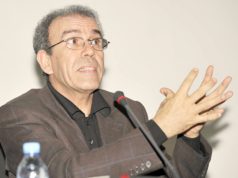
Muscat, Sultanate of Oman (TMT)—Eminent Biomedical Scientist, Professor Phil Stephens, shared his scientific vision, on the immense possibilities of stem cell research, with Ahmed Mohiuddin Siddiqui in Muscat, Sultanate of Oman. He is the Research Theme Lead for Biosystems at the College of Biomedical and Life Sciences, Cardiff University, United Kingdom.
Prof. Phil Stephens spoke to The Moroccan Times on Monday, on the sidelines of a 2-day workshop on research collaboration between the United Kingdom and the Sultanate of Oman conducted by the Ministry of Health, Oman.
The theme of the workshop was conceived by Abdallah bin Ahmed Al Rubaeiy, Dean, OSNI, Oman. Experts in healthcare led by Professor Dylan Jones, Pro Vice Chancellor, College of Biomedical and Life Sciences, Cardiff University and research experts from the Sultanate’s Directorate of Research in the Ministry of Health presented new findings that highlighted the potential collaboration on applied research in healthcare sciences, research into Cancer, pharmacological and pharmaceutical sciences research, population health, structural bio-physics, optometry and vision sciences research.
Dr Dianne Watkins, International Dean, Cardiff University presented her findings on Applied Research in Healthcare Sciences, which were profoundly applauded by the audience. Prof John Chester shed light on new research on Cancer. Prof. Phil Stephens spoke eloquently on Bio-system research that prompted the interview below. Prof. Gary Baxter’s paper dealt with research in Pharmacology and Pharmaceutical Sciences and Prof. Andrew Quantock spoke about the Structural Biophysics, Optometry and Vision Science Research, especially for those who suffer from vision loss.
How birds use earth’s gravity to navigate their way was another point that generated a lot of interest. All the aforementioned professors and scientists are from the United Kingdom.
Sultana Al Sabahi talked about the research priorities for Ministry of Health, Oman. Dr Adhra bint Hilal Al Mawali outlined the Health Vision 2050 for Health Research in Oman.
The scientific world is gripped with excitement about the range of possibilities in curing different dreaded diseases with stem cell therapy.
Excerpts from the interview with Prof. Phil Stephens:
Welcome to this conversation with The Moroccan Times. How do you view the need for more stem cell banks?
I think it’s important to consider and regulate the stem cell banks across the world, for example, stem cell banking in the United Kingdom (UK) is ethically regulated. It is important to get access to stem cells but you have to know what they are capable of and what you want them to do rather than just have a bank for the sake of a bank. It should be driven by the clinical need. It is important for time regulation because stem cells have much potential to do a lot of things. We have to make sure that they are used in a responsible way.
How will bio-materials revolutionize treatment of diseases?
Well, that’s a big, big question. I think we are coming to a point where we are realizing that maybe by just adding cells in stem therapy is not going to be necessarily the best thing. Stem cells exist within a three-dimensional environment. So, it’s the matrix, the bio-material that is important in the control of the responses. It is important to design by the right material to deliver the cells at the right time and the right location. But the control is important. There is not currently one single bio-material that is suitable for all clinical situations. However, new generation polymers are being developed, which hold much prospect. Ultimate biomaterial design is dependent on what you want to do with cells.
How do you justify funding of stem cell research by pharmaceutical industry who have their own interests in selling the new medicines for profit?
During this workshop, we have talked a lot about translation, about deriving benefits for patients but as universities we cannot do it on our own. We have to collaborate and work closely with pharmaceutical industry because they have the budgets to do it. Hence, this is a relationship that we should develop closely as any future investment via this route. It will enable us to invest in more research to derive more benefits for patients.
How about having a single stem cell vaccine for all diseases?
A stem cell vaccine for all the diseases would be wonderful but I don’t think that will happen soon. I think that there will be stem cell therapies for specific diseases but a universal therapy is many years away. Maybe we will get to a point of the development of stem cells for different therapeutic routes. We have different collections of stem cells but to suggest that there is one ‘super’ stem cell is not the current situation.
There is a severe shortage of human body parts for transplantation and convincing people to donate body organs is a tedious task. Which body parts can be produced on a mass scale using the stem cells? Can hearts and kidneys be produced using stem cells in large numbers?
We are getting closer to reproducing organs –for example, we have been able to make skin for many years. Making hearts and kidneys is still some way off but utilizing stem cells to ‘regenerate’ disease/damaged organs is getting closer.







